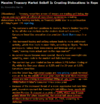Value Collector
Have courage, and be kind.
- Joined
- 13 January 2014
- Posts
- 12,242
- Reactions
- 8,496
Well I am not sure what you mean by blowing up, but sure there will be fluctuations in the prices of existing bonds, but new bonds that are issued will be issued at higher interest rates, and would be attractive to a lot of people, the older lower Interest bonds will create losses for any short term traders that bought them thinking they were going to go up in value, but as I said the long term guys that just warehouse them on their books till maturity won’t feel a thing.That won't stop the debt market blowing up and taking everything else with it.



